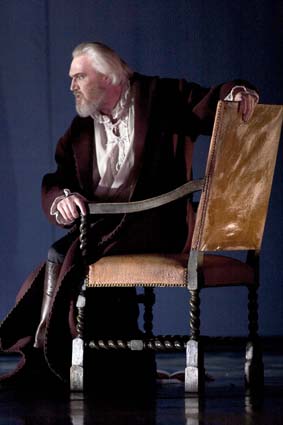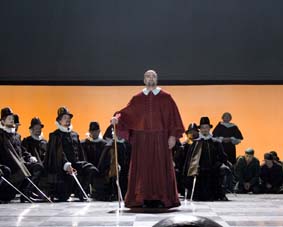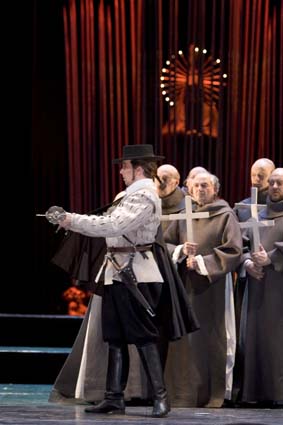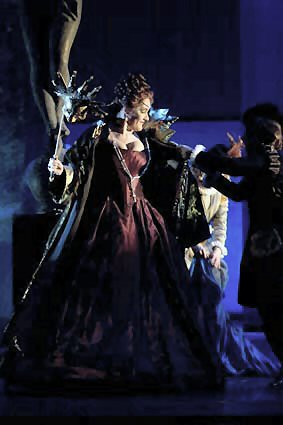Seen and Heard International Opera
Review
Giuseppe VERDI, Don Carlos
at The Royal Opera in Stockholm, February 12, 2005 (GF)

This production of Don Carlos was premiered on December
11, 1999 but this revival has several new singers, however. Directed
by Friedrich Meyer-Oertel, with sets, costumes and light design
by Maren Christensen, it is played in period costumes but set
in neutral, restrained sets. The actual settings are just hinted
at with a few props, the atmosphere created with colouring, half-transparent
curtains and the hydraulics of the stage machinery. The “clean”
stage picture means that the action comes to the foreground; it
also means that very short pauses have to be made between the
many scenes in the drama, which makes this, the longest of Verdi’s
operas, feel short and compact. Including one interval after Act
III it takes less than four hours – and still, this Stockholm
version is unusually long since the director has opted for inclusion
of several usually cut passages to clarify the action.
That the performance hangs together and never
feels long-winded is something the conductor, Pier Giorgio Morandi,
has to take credit for. He never goes to extremes, but he moves
things on; he is rhythmically alert and he can build climaxes
to impressive effect. Once or twice one can get the feeling he
is missing a dimension of the drama, Philip’s monologue
in Act IV being one example. The orchestral prelude is finely
played with the wonderful cello solo beautifully realised but
it is too “outward”. And when Philip sings his soliloquy
it becomes more like a public proclamation. Jaakko Ryhänen
sings it magnificently, of course – what a wonderful singer
he is! – but still I would have liked it more scaled down,
which it is on the Naxos recording made shortly after the premiere
in 1999, where Ryhänen also took the part. But this is an
exception. In general Morandi’s interpretation is outstanding.

Just as in the Tosca
performance I reviewed at the beginning of January, the orchestra
played exceptionally well. Badea then, and Morandi now, are obviously
the right conductors to raise Hovkapellet (The Royal
Court Orchestra) another inch or two from an already high level.
Morandi is no newcomer to the Royal Opera, however: he conducted
exquisite performances of Norma a couple of years ago,
and that he is appreciated by the musicians was obvious from the
fact that the orchestra gave a touche.
The opera chorus were also on their best behaviour in this taxing
opera. Mainly, in this staging, the chorus is treated as a collective,
moving in groups, dressed uniformly. The great auto da fé
scene is an obvious example where the heretics, brought to the
stake, are individuals sticking out from the broad mass of the
people, who in their turn are dressed in Mao-like costumes and
move almost mechanically. The soloists act to a great extent “formally”,
as befits nobles from the 16th century, with gestures, positionings
and movements stereotyped. The exception is Don Carlos himself
who lurks around like in a dream. The costumes are in general
sober in colour, although Elisabeth in virginal white and Eboli
in sinful red stand out.

The singing is also outstanding and to a large degree this was
the singers’ afternoon. I have already mentioned Jaakko
Ryhänen as Philip. He has been singing great parts in Finland
- and all over Europe - for many years now and is approaching
60, but there is no evidence of vocal decline. It was always a
magnificent instrument, a true bass with enormous power to fill
even the largest hall, and at the same time such a beautiful voice.
There is something of Kim Borg’s warmth in it. If Ryhänen’s
voice is big, then Hans-Peter König’s is even bigger.
He has enormous presence, not through his acting, which in his
part as the Grand Inquisitor is rudimentary anyway, but his voice
has that thunderstorm quality that makes you want to seek shelter.
I heard him in the same part in Helsinki not long ago and was
equally impressed. A third bass with a good voice, although not
of the size of the two already mentioned, is Lennart Forsén
in the small part of the monk.
At the other end of the voice spectrum we find Hillevi Martinpelto,
who was also in the original production and also on the Naxos
recording. And here I felt a bit hesitant when I walked to the
Opera House, since on the recording she sometimes sounds strained
and shrill. After five years, however, Martinpelto now exposes
a perfect Lirico spinto voice, clear as a bell, beautiful and
with the impressive ability to expand at climaxes. She also acts
convincingly within the confines I mentioned earlier. I think
with hindsight, that in 1999 she was still too much a lyric soprano,
for whom Elisabeth de Valois was a number too large and now her
voice has grown into the role.

Young Martina Dike, who has gone from strength
to strength over the last few years, makes an Eboli where the
sparks flew. She is powerful, intense, absolutely steady and the
end of ‘O Don fatale’ almost knocked out
the audience. The two friends Rodrigo (Posa) and Don Carlos are
also excellently done. Jesper Taube’s baritone may not be
king size but it is a fine voice with a manly timbre and he uses
it intelligently. As an actor he has authority and in the death
scene he also shows his lyrical qualities.
So does also Badri Maisuradze, especially in the duet with Elisabeth
in the final scene of the opera. Otherwise, this Georgian singer
has a large, powerful tenor with shining high notes. I heard him
a little more than ten years ago when he was one of the three
prize-winners in The Jussi Björling Tenor Competition, held
in Borlänge, Björling’s birthplace. Even then
he made an impression and a decade of singing big roles in important
opera houses has made him develop further.
To sum up, The Royal Opera in Stockholm have come up with another
trump card. A great evening!
Göran Forsling
Jaakko Ryhänen as Philip, Hans-Peter König
as Grand Inquisitor, Jesper Taube as Rodrigo, Martina Dike as
Eboli: © Alexander Kenney, Royal Opera in Stockholm, February
2005






